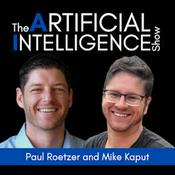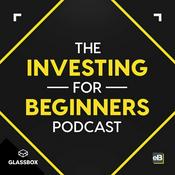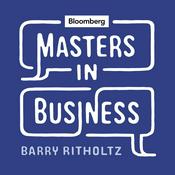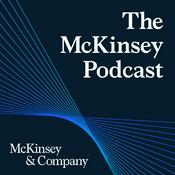109 episodes
- Join us for a heartfelt conversation on The Agile Coach Podcast, where Pabitra sits down with Tyrone Dollison Jr, a true example of resilience and transformation. Tyrone’s story is anything but linear.
He’s worn many hats, from working in education and finance to diving deep into analytics, and eventually making his mark as a product leader in tech. Along the way, he’s faced self-doubt, career pivots, and the challenge of breaking into a new industry without a traditional background.
In this episode, Tyrone opens up about the real struggles and wins that shaped his journey. He shares how reframing his identity, from “finance guy” to “tech professional” was a game-changer, and why knowing your own story inside out is the secret sauce for nailing interviews.
What You’ll Learn:
The mindset shift that helped Tyrone see himself as a tech professional—and why that matters more than your resume
How to prepare for interviews so you can confidently talk about your experience (and not sound like a robot)
Building real connections with recruiters and why those relationships can open unexpected doors
The art of storytelling in interviews, using the STAR method, and how to share both real and hypothetical stories to show your thinking
What to do when you don’t know the answer to a question (hint: honesty and curiosity go a long way)
Why helping others in your network can come back to help you in surprising ways
How to treat interviews as a two-way street, gathering data about companies and making sure they’re the right fit for you
If you enjoy this episode, we’d love for you to rate, review, and share it with your friends! Breaking Into Tech: Journeys of Sid Sachdeva, Paulo Carini, Haley Prestwood, and Darian Riley
2025/6/04 | 1h 12 mins.In this special episode of The Agile Coach Podcast, we bring together four inspiring guests: Sid Sachdeva, Paulo Carini, Haley Prestwood, and Darian Riley, each sharing their unique path into the tech industry.
From international students navigating visa challenges to career changers leveraging non-technical backgrounds, this episode is packed with practical advice, candid reflections, and actionable strategies for anyone aspiring to break into tech roles like Product Manager, Scrum Master, or Agile Coach.
Key Topics & Insights
1. Overcoming Barriers as International Students
Sid Sachdeva and Paulo Carini recount their experiences moving to the U.S. for education, facing uncertainties, and navigating the additional hurdles of visa sponsorship and limited interview opportunities.
They emphasize the importance of persistence, networking, and standing out by being resourceful and indispensable to their teams.
2. Leveraging Non-Traditional Backgrounds
Haley Prestwood and Darian Riley highlight how skills from unrelated fields, such as philosophy, politics, law, and even Division I basketball coaching, can translate into tech roles.
Both stress the value of soft skills: communication, facilitation, and leadership, which are often more critical than technical expertise for roles like Scrum Master and Product Manager.
3. The Power of Mentorship and Community
All guests credit mentorship, peer support, and structured bootcamps (like the Agile Coach Program) as pivotal in their transitions.
Mock interviews, feedback from experienced practitioners, and ongoing community support helped them build confidence and refine their approach to job applications and interviews.
4. Mindset Shifts and Dealing with Imposter Syndrome
Haley and Sid discuss the emotional journey, moving from self-doubt and imposter syndrome to confidence and self-advocacy.
They encourage listeners to "lean into discomfort," ask questions, and recognize that growth happens outside the comfort zone.
5. Practical Job Search Strategies
The guests share actionable tactics: rigorous interview prep, building detailed Q&A documents, practicing with mentors, and making themselves available for opportunities at any time.
Paulo and Sid note the importance of being proactive, applying to many positions, and not being discouraged by rejections, especially as international candidates.
6. Transitioning and Thriving in Tech Roles
Once in their roles, guests focused on continuous learning, building relationships with team members, and seeking feedback.
Darian Riley, now a senior agile leader, describes how coaching and servant leadership skills from sports directly informed his agile practice, team empowerment, and ability to drive business value.
7. Embracing Remote Work and Flexibility
Haley and Paulo reflect on the benefits and adjustments of remote work, including the freedom to travel and the need for self-discipline and asynchronous communication.
8. The Role of AI and Continuous Upskilling
The panel discusses how AI tools are transforming learning and productivity, making it easier to upskill and adapt to new challenges in tech.
KEY TAKEAWAYS:
Persistence Pays Off: Breaking into tech, especially as an international student or career changer, requires resilience, relentless application, and a willingness to stand out.
Soft Skills Matter: Communication, leadership, and adaptability often outweigh technical skills, especially in agile roles.
Mentorship Accelerates Growth: Seek out mentors, practice interviews, and leverage community resources.
Mindset is Everything: Overcoming self-doubt and embracing discomfort are crucial for growth.
Be Proactive and Prepared: Prepare extensively for interviews, make yourself available, and treat every opportunity as potentially life-changing.
Continuous Learning: Invest in your own growth, leverage AI tools, and never stop improving.- In this special episode of The Agile Coach Podcast, leading voices in product ownership and agile transformation: Joe Justice, Richard Seroter, Mark Shead, Sheetal Rajpal, and Jeff Bubolz, share their hard-won lessons from building and scaling products at organizations like Tesla, Google, Amazon, LendingTree, and more. Their experiences span hardware and software, startups and global enterprises, and regulated industries, offering a comprehensive look at what it truly means to be an effective product owner today.
Key Product Ownership Insights:
Joe Justice (Agile Business Institute, ex-Tesla, WikiSpeed)
Agility as Innovation Engine: Agility is about making change cheaper, faster, and less emotionally taxing. At Tesla, the “Justice Board” (a cascading chain of KPIs) aligns everyone to the mission, empowering any contributor to propose measurable experiments that advance the master plan12.
Embedded Leadership: Leaders, including product owners, should be deeply involved with teams—removing barriers, modeling commitment, and sharing ownership of outcomes.
Mob Programming for Ownership: High-performing teams share business context and technical knowledge through practices like mob programming, making the product owner an integral, accessible part of the team rather than a distant decision-maker.
Richard Seroter (Google Cloud)
The PO as Value Translator: The product owner is not a distant spec-writer but an “intense stakeholder”—embedded with engineers, translating customer needs into actionable stories, and prioritizing with courage and clarity.
Continuous Feedback & Data-Driven Decisions: Modern product teams thrive on small batch delivery and rapid feedback. Product owners must be adept at interpreting telemetry and customer data to inform priorities and validate outcomes quickly.
Role Fluidity: In some organizations, the distinction between product owner and product manager blurs, but the core remains: maximizing value by being close to both customers and the delivery team, reducing friction between vision and execution.
Mark Shead (Xeric Corporation)
Principles Over Labels: True agility is about living agile values and principles, not just adopting practices or titles. Teams and product owners must align decisions to core agile principles, not just mimic successful teams elsewhere.
Embedded Product Owners: The most effective product owners are those who use the product themselves and are continuously available to the team—answering questions, clarifying needs, and making real-time decisions.
Backlog as a Living Tool: Product owners must ruthlessly prioritize, avoid bloated backlogs, and focus on delivering customer value, not just accumulating requests or technical debt.
Sheetal Rajpal (Head of Product; ex-Amazon, LendingTree)
Customer-Centricity & Data: Product owners must “walk in the customer’s shoes,” using data and direct observation to continuously improve user experience and product outcomes.
Strategic Product Thinking: At Amazon, product leaders own both strategy and execution—articulating a clear vision, defining decision-making tenets, and using the “working backwards” process to align teams around customer-centric outcomes.
Building Data-Driven Products: Making products data-driven requires clarity on objectives, a deep understanding of data quality, and explicit constraints—especially when leveraging AI or machine learning.
Jeff Bubolz (Organizational Agility Advisor, Co-Founder)
Focus & Trade-Offs: The essence of product ownership is making tough trade-offs and saying “no” as often as “yes.” A focused, strategic backlog is more valuable than a frantic, overloaded one16.
Scaling Without Overhead: When scaling, avoid creating layers of product owners and managers that add friction. Instead, form autonomous, cross-functional teams aligned to real products and outcomes.
The Three Vs: Product owners should set Vision, maximize Value, and Validate outcomes—prioritizing learning and continuous improvement over rigid plans.
Practical Advice for Product Owners
Be Embedded: The best product owners are part of the team’s daily life, not just attending ceremonies or writing requirements. They are accessible, knowledgeable, and invested in both the product and the people.
Prioritize Ruthlessly: Every “yes” to a backlog item is a “no” to something else. Product owners must be strategic, focusing on what delivers the most value and aligns with the product vision.
Align on Principles: Start with shared understanding of agile principles and values, then select practices that support those principles in your context.
Use Data Effectively: Leverage real-time data and customer feedback to inform decisions, validate outcomes, and iterate quickly.
Enable Team Autonomy: Empower teams to solve problems, avoid micromanagement, and foster a culture of continuous learning and experimentation.
Strategic Scaling: When scaling, ensure teams remain cross-functional and outcome-oriented, not siloed by function or weighed down by management layers.
Quotes from the Episode
“Agility is making change cheaper in time and money, and also in emotional willpower—making it less draining or even more fun. That is the game.” — Joe Justice
“A product owner is not an arm’s length participant. You should be pairing with engineers, getting rapid feedback, and translating customer needs into value.” — Richard Seroter
“The most effective product owners I’ve ever worked with were embedded with the team, using the software daily, and always available to help.”
— Mark Shead
“At Amazon, PMs own both strategy and execution—articulating vision, setting decision-making tenets, and working backwards from the customer.” — Sheetal Rajpal
“The essence of product ownership is making tough trade-offs and saying no as often as yes. Focused, strategic backlogs unlock value.” — Jeff Bubolz AI-Ready Product Management: Richard Seroter on Building, Leading, and Innovating with Google Cloud’s AI Stack
2025/5/14 | 49 mins.In this episode of The Agile Coach Podcast, host Vivek Khattri is joined by Richard Seroter, Chief Evangelist at Google Cloud and a returning guest, for a candid conversation about the future of product management and AI.
Richard shares his journey from leading outbound product management teams to driving developer relations at Google, offering an insider’s perspective on Google Cloud’s AI strategy and what it means for product leaders, teams, and organizations.
Richard unpacks how Google’s unique AI stack-from foundational research and custom TPUs to platforms like Vertex and Gemini-powered assistants-is shaping the next generation of products.
The discussion dives deep into how AI is transforming the role of product managers and product owners, and why adaptability, curiosity, and discipline are more critical than ever.
Key Takeaways
Google’s AI Stack: More Than Hype
Google’s end-to-end AI stack spans research, custom hardware (TPUs), foundational models (like Gemini), platforms (Vertex), and user-facing tools that power everything from Gmail to code assistants.
The focus: Make AI widely useful and integrated-not just a novelty.
Product Management in the Age of AI
AI accelerates landscape analysis, market research, and prototyping-what once took weeks can now happen in minutes.
Product managers must ruthlessly prioritize, know when to quit, and focus on high-impact opportunities-even at large companies like Google.
Timeless Skills for Modern PMs
Humility, curiosity, and discipline remain essential. The best PMs lead through influence, not authority, and are relentless about customer empathy.
“Customer zero” mindset: Use your own product to build insight and credibility.
AI Fluency for Teams
Becoming “AI first” starts with being “AI ready.” Upskill every team member, from executive assistants to general managers, in foundational AI concepts and tools.
Build comfort and reduce anxiety by encouraging experimentation and bottom-up idea generation.
Prototyping and Communication
The days of 50-page specs are fading. Use AI tools to create prototypes, videos, and visual artifacts-even if you don’t code-to communicate ideas and inspire teams.
Product owners and managers must own the translation from concept to working representation.
Building Trust and Responsible AI
Avoid the “black box” trap: Understand how LLMs fit into architectures, and design for transparency, real-time updates, and responsible evaluation.
Regularly test and update systems as models evolve to maintain quality and trust.
Agents and Agent Platforms
Agents are redefining automation and business processes. Google’s Agent Space and development kits enable low-code/no-code agent creation and orchestration.
Product leaders should familiarize themselves with agent frameworks to unlock new possibilities for users and businesses.
Lead the Change
AI isn’t just about productivity-it’s about doing better, more fulfilling work at higher quality and impact.
Don’t wait for AI to reshape your role. Proactively lead your career and organization through this transformation.
Connect with Richard Seroter:
LinkedIn: https://www.linkedin.com/in/seroter/
Timestamps:
00:00 – Introduction: Richard’s journey and evolving role at Google Cloud
02:00 – Google’s AI stack: From research to real-world applications
05:00 – Product strategy: Where PMs add value in an AI-driven world
10:00 – Prioritization, opportunity cost, and ruthless focus at scale
12:00 – Timeless PM skills: Humility, curiosity, and discipline
16:00 – AI fluency: Upskilling teams and building readiness
20:00 – Prototyping and communication: New tools for product owners
24:00 – AI’s impact on engineering productivity and team workflows
28:00 – Actionable steps for AI-ready teams: Artifacts, documentation, and collaboration
32:00 – Tools, research, and continuous customer feedback at Google
35:00 – Misconceptions and best practices in building AI products
40:00 – Scoping MVPs and defining requirements for AI-powered features
42:00 – Agents and agent platforms: The next frontier in automation
46:00 – The future of work: Leading with AI, not just adapting to it
48:00 – Closing thoughts: Be the driver of change, not the passenger- In this episode of The Agile Coach Podcast, we bring together a powerhouse panel of product management leaders: Diego Granados, Richard Seroter, Rajsi Rana, Neha Satya, and Parth Detroja. Each guest shares their unique journey into product management, offering firsthand perspectives from top companies like Microsoft, Oracle, Google, and beyond.
Our conversation explores how backgrounds in healthcare, finance, and data analytics can lead to thriving PM careers, emphasizing that a technical degree is not a prerequisite for success. The guests break down the core skills needed-critical thinking, emotional intelligence, cross-functional collaboration-and provide actionable advice for anyone aspiring to break into or advance within product management.
We also discuss the differences between PM roles at startups versus large enterprises, the evolving relationship between product managers and product owners, and how to lead through influence rather than authority. The episode is packed with practical strategies for interviews, panel preparation, and building daily habits that set PMs apart in a competitive field.
Featured Guests:
Diego Granados
Richard Seroter
Rajsi Rana
Neha Satya
Parth Detroja
Key Takeaways:
Diverse Backgrounds: Success in product management is possible from non-traditional backgrounds-technical degrees are helpful but not required.
Foundational Skills: Critical thinking, emotional intelligence, and cross-functional teamwork are essential.
Dealing with Ambiguity: PMs must drive clarity and connect customer needs, business objectives, and technical feasibility.
Influence Over Authority: Product managers lead through storytelling, data, and consensus-not direct authority.
Customer Focus: The best PMs relentlessly advocate for the customer at every product stage.
Role Clarity: The distinction between product manager and product owner varies by company, but both require close collaboration with engineering and stakeholders.
Interviewing & Preparation: Build rapport with recruiters, use relevant buzzwords, tailor your story, and research your interview panel.
Continuous Improvement: Treat product management and interviewing as skills to be honed daily-write, practice, and seek feedback.
Timestamps
00:00 – Introduction: Meet the guests and their journeys
02:00 – Do you need a technical background? Myths debunked
05:00 – What does a product manager really do?
08:00 – Core skills: Ambiguity, cross-functional work, and influence
12:00 – Defining your PM role and career growth
15:00 – Product owner vs. product manager: Real-world perspectives
20:00 – Leading through influence, not authority
24:00 – Building strong partnerships with engineering
26:00 – Interview tips: Recruiter calls and panel strategies
30:00 – Daily habits for PM success and continuous learning
32:00 – Final thoughts: Growth mindset and resilience in the PM journey
More Business podcasts
Trending Business podcasts
About The Agile Coach Podcast
We bring amazing agile minded individuals from product, coaching, entrepreneurship, and engineering space and bring you an immersive learning experience through stories and practices.
If you are an aspiring or new Scrum Master, Business Analyst, Product Owner, or Product Manager; you will take away a lot from these conversations!
Podcast websiteListen to The Agile Coach Podcast, The Diary Of A CEO with Steven Bartlett and many other podcasts from around the world with the radio.net app
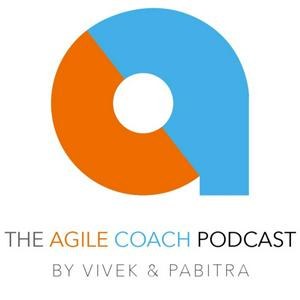
Get the free radio.net app
- Stations and podcasts to bookmark
- Stream via Wi-Fi or Bluetooth
- Supports Carplay & Android Auto
- Many other app features
Get the free radio.net app
- Stations and podcasts to bookmark
- Stream via Wi-Fi or Bluetooth
- Supports Carplay & Android Auto
- Many other app features


The Agile Coach Podcast
Scan code,
download the app,
start listening.
download the app,
start listening.













